Copyright 2011 by Corwin
First Skyhorse edition 2014
All Rights Reserved. No part of this book may be reproduced in any manner without the express written consent of the publisher, except in the case of brief excerpts in critical reviews or articles. All inquiries should be addressed to Skyhorse Publishing, 307 West 36th Street, 11th Floor, New York, NY 10018.
Skyhorse Publishing books may be purchased in bulk at special discounts for sales promotion, corporate gifts, fund-raising, or educational purposes. Special editions can also be created to specifications. For details, contact the Special Sales Department, Skyhorse Publishing, 307 West 36th Street, 11th Floor, New York, NY 10018 or .
Skyhorse and Skyhorse Publishing are registered trademarks of Skyhorse Publishing, Inc., a Delaware corporation.
www.skyhorsepublishing.com
10 9 8 7 6 5 4 3 2 1
Library of Congress Cataloging-in-Publication Data is available on file.
ISBN: 978-1-62873-756-1
E-book ISBN: 978-1-62914-125-1
Printed in China
Contents
Acknowledgments
F irst and foremost, we wish to thank our families for the love, support, and faith in us they have shown over the years. We would like to particularly thank Ron, Sarah, Kylie, Scott, Paul, and William for their never-ending patience. We would have never gotten this far without you.
We would like to thank those involved in the Wanna Play Programs Internship Program for their energy and enthusiasm. Your work will touch many children for years to come, and we wish you luck in your future. We would also like to thank our staff for their hard work, dedication, and creativity. Without your love and genius, the program would never have grown the way it has.
Finally, we would like to thank the families we have been working with over the years. The parents and children we have had the honor to work with have taught us the true meaning of strength. We have learned more than we have taught.
Thank you,
Ruth and Beth

About the Authors
 Ruth Herron Ross, codirector and coauthor of the Wanna Play Program, holds a Bachelor of Science in early childhood elementary education from Beaver College and a Master of Science in special education and specialty reading from St. Josephs University. Ruth has dedicated her life to the education of children with special needs and the autism community. Ruth has worked with children from ages 2 to 17 and is trained in a variety of one-on-one early intervention and therapeutic programs such as ABA, Floortime, Son-Rise, and Interactive Metronome. Her 15 years of education experiences, combined with her early intervention training, gave Ruth the foundation of knowledge in autism, language development, and socialization skills to create the Wanna Play Program. Over the years she has provided numerous trainings to parents and professional and is a founding member and lead trainer of the Valley Forge Education Services community outreach program, Caring Kinships: ASDMatching Families With Sitters. Ruth has been facilitating social skill groups and individual sessions for children as director of the Pennsylvania location for the past 10 years and in the New Jersey location for the past 2 years.
Ruth Herron Ross, codirector and coauthor of the Wanna Play Program, holds a Bachelor of Science in early childhood elementary education from Beaver College and a Master of Science in special education and specialty reading from St. Josephs University. Ruth has dedicated her life to the education of children with special needs and the autism community. Ruth has worked with children from ages 2 to 17 and is trained in a variety of one-on-one early intervention and therapeutic programs such as ABA, Floortime, Son-Rise, and Interactive Metronome. Her 15 years of education experiences, combined with her early intervention training, gave Ruth the foundation of knowledge in autism, language development, and socialization skills to create the Wanna Play Program. Over the years she has provided numerous trainings to parents and professional and is a founding member and lead trainer of the Valley Forge Education Services community outreach program, Caring Kinships: ASDMatching Families With Sitters. Ruth has been facilitating social skill groups and individual sessions for children as director of the Pennsylvania location for the past 10 years and in the New Jersey location for the past 2 years.
 Beth Roberts-Pacchione is coauthor and codirector of the Wanna Play Program. Beth received her Master of Arts degree in counseling psychology at Eastern University and is continuing the process to become a licensed counselor in Pennsylvania. After Beths daughter was diagnosed with Global Developmental Delay and autistic tendencies, she was uncertain about how to best help her. She decided both to receive training in and administer a home-based program called Son-Rise. She also researched, tested, and utilized many different alternative therapies, dietary interventions, and behavioral approaches. Beth has also been trained in Floortime and Interactive Metronome, and she has worked in ABA programs. For the past 10 years at the Pennsylvania location of the Wanna Play Program, Beth has been facilitating social skill groups and individual sessions for children ages 3 through 17 years. She is now beginning to counsel adults to provide therapeutic support to those parents whose children have been diagnosed with special needs.
Beth Roberts-Pacchione is coauthor and codirector of the Wanna Play Program. Beth received her Master of Arts degree in counseling psychology at Eastern University and is continuing the process to become a licensed counselor in Pennsylvania. After Beths daughter was diagnosed with Global Developmental Delay and autistic tendencies, she was uncertain about how to best help her. She decided both to receive training in and administer a home-based program called Son-Rise. She also researched, tested, and utilized many different alternative therapies, dietary interventions, and behavioral approaches. Beth has also been trained in Floortime and Interactive Metronome, and she has worked in ABA programs. For the past 10 years at the Pennsylvania location of the Wanna Play Program, Beth has been facilitating social skill groups and individual sessions for children ages 3 through 17 years. She is now beginning to counsel adults to provide therapeutic support to those parents whose children have been diagnosed with special needs.
Introduction
Welcome to the Wanna Play Program
W e are very thrilled for the opportunity to put together this revised edition of Wanna Play: Friendship Skills for Preschool and Elementary Grades . The Wanna Play Program was developed as the result of our experience in early intervention and social behavior development. Both of us have had personal journeys with the development of this program. It has been inspired by our own childrens growth and that of all the children we have been lucky enough to join for a part of their journey. We found that children were not applying the social skills they had learned in school and community settings. There were few programs dealing with socialization that accommodated children on many different interactive levels. We have directed social groups in our Pennsylvania location as well as running groups and training professionals in schools and other therapeutic environments. We began developing a meaningful approach to these skills and realized the need for this type of supportive, instructional programming. This led to the creation of Wanna Play, Inc. in 2001. The program is proud to be celebrating 10 years of providing social skills development and behavior support. Over the years, this program has been used with success by everyone from teachers to babysitters. Developing interactive social ability and an understanding of social norms in children is the responsibility of all adults and crosses disciplines.
We have reworked this edition to be more effective and added to the programs strengths for a more enriched social experience. There has been new research into the importance of social skills and the acquisition of these skills. Most childrens programming includes a social and behavior element. The understanding that a childs social and behavioral development is necessary for the development of cognitive and physical skills is becoming more and more readily accepted in educational models. Therefore, we have strengthened the programs effectiveness in inclusive classroom settings. We have seen that when these topics are used in inclusive settings, the strategies used by adults and the behaviors and social skills taught become part of the school culture and all children benefit. We have made this edition more user-friendly for teachers by adding more detail to the activities themselves. There are details guiding teachers with lesson objectives and goals. More suggestions have been added for compensating for different cognitive and developmental levels. Specifics about lesson preparation and implementation time have been added to help the flow of lesson planning. All of these changes will help teachers provide a strong social development program in their schools. It is very important for children to develop an emotional vocabulary to express their feelings and frustrations. Many negative behaviors come from childrens inability to communicate what they want and how they feel. We have addressed this with the addition of a new chapter that helps children with understanding emotional expression. The chapter looks at emotional expression from the perspectives of (1) personal expression and (2) interpreting others emotions when we are interacting. It is important for children to be able to not only express themselves appropriately but also understand others feelings and respond to them in a meaningful way.

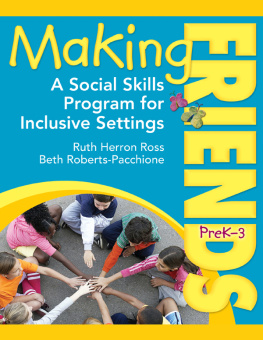
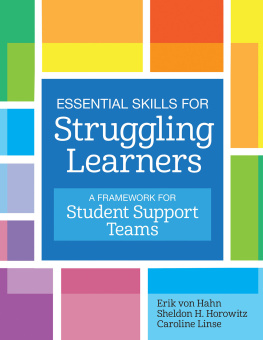

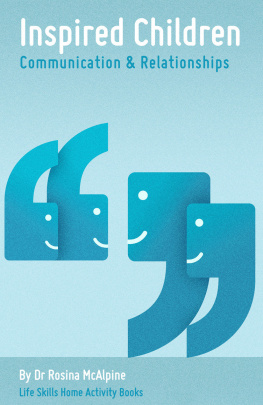
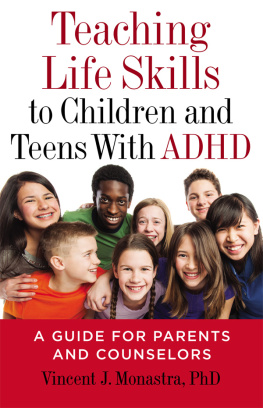
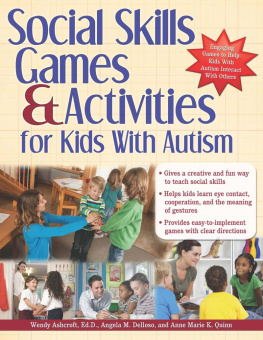
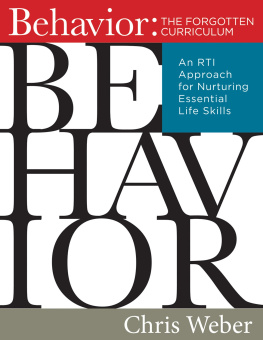

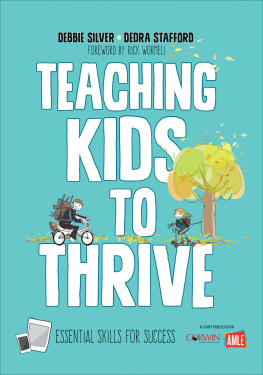
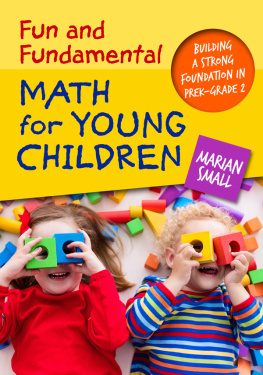


 Ruth Herron Ross, codirector and coauthor of the Wanna Play Program, holds a Bachelor of Science in early childhood elementary education from Beaver College and a Master of Science in special education and specialty reading from St. Josephs University. Ruth has dedicated her life to the education of children with special needs and the autism community. Ruth has worked with children from ages 2 to 17 and is trained in a variety of one-on-one early intervention and therapeutic programs such as ABA, Floortime, Son-Rise, and Interactive Metronome. Her 15 years of education experiences, combined with her early intervention training, gave Ruth the foundation of knowledge in autism, language development, and socialization skills to create the Wanna Play Program. Over the years she has provided numerous trainings to parents and professional and is a founding member and lead trainer of the Valley Forge Education Services community outreach program, Caring Kinships: ASDMatching Families With Sitters. Ruth has been facilitating social skill groups and individual sessions for children as director of the Pennsylvania location for the past 10 years and in the New Jersey location for the past 2 years.
Ruth Herron Ross, codirector and coauthor of the Wanna Play Program, holds a Bachelor of Science in early childhood elementary education from Beaver College and a Master of Science in special education and specialty reading from St. Josephs University. Ruth has dedicated her life to the education of children with special needs and the autism community. Ruth has worked with children from ages 2 to 17 and is trained in a variety of one-on-one early intervention and therapeutic programs such as ABA, Floortime, Son-Rise, and Interactive Metronome. Her 15 years of education experiences, combined with her early intervention training, gave Ruth the foundation of knowledge in autism, language development, and socialization skills to create the Wanna Play Program. Over the years she has provided numerous trainings to parents and professional and is a founding member and lead trainer of the Valley Forge Education Services community outreach program, Caring Kinships: ASDMatching Families With Sitters. Ruth has been facilitating social skill groups and individual sessions for children as director of the Pennsylvania location for the past 10 years and in the New Jersey location for the past 2 years. Beth Roberts-Pacchione is coauthor and codirector of the Wanna Play Program. Beth received her Master of Arts degree in counseling psychology at Eastern University and is continuing the process to become a licensed counselor in Pennsylvania. After Beths daughter was diagnosed with Global Developmental Delay and autistic tendencies, she was uncertain about how to best help her. She decided both to receive training in and administer a home-based program called Son-Rise. She also researched, tested, and utilized many different alternative therapies, dietary interventions, and behavioral approaches. Beth has also been trained in Floortime and Interactive Metronome, and she has worked in ABA programs. For the past 10 years at the Pennsylvania location of the Wanna Play Program, Beth has been facilitating social skill groups and individual sessions for children ages 3 through 17 years. She is now beginning to counsel adults to provide therapeutic support to those parents whose children have been diagnosed with special needs.
Beth Roberts-Pacchione is coauthor and codirector of the Wanna Play Program. Beth received her Master of Arts degree in counseling psychology at Eastern University and is continuing the process to become a licensed counselor in Pennsylvania. After Beths daughter was diagnosed with Global Developmental Delay and autistic tendencies, she was uncertain about how to best help her. She decided both to receive training in and administer a home-based program called Son-Rise. She also researched, tested, and utilized many different alternative therapies, dietary interventions, and behavioral approaches. Beth has also been trained in Floortime and Interactive Metronome, and she has worked in ABA programs. For the past 10 years at the Pennsylvania location of the Wanna Play Program, Beth has been facilitating social skill groups and individual sessions for children ages 3 through 17 years. She is now beginning to counsel adults to provide therapeutic support to those parents whose children have been diagnosed with special needs.